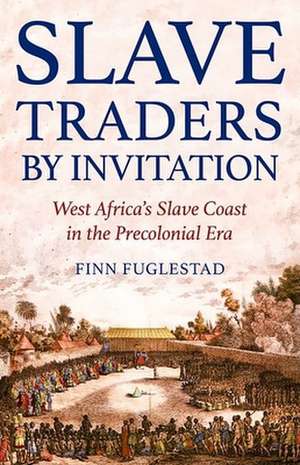Slave Traders by Invitation
Autor Finn Fuglestaden Limba Engleză Hardback – aug 2018
due to a lagoon which ran parallel to the coast. The local inhabitants were not only sheltered against incursions from the sea, but were also locked off from it. Yet, paradoxically, it was this coastline that witnessed a thriving long-term commercial relation-ship between Europeans and Africans,
based on the trans-Atlantic slave trade. How did it come about? How was it all organised? And how did the locals react to the opportunities these new trading relations offered them? The Kingdom of Dahomey is usually cited as the Slave Coast's archetypical slave raiding and slave trading polity. An
inland realm, it was a latecomer to the slave trade, and simply incorporated a pre-existing system by dint of military prowess, which ultimately was to prove radically counterproductive. Fuglestad's book seeks to explain the Dahomean 'anomaly' and its impact on the Slave Coast's societies and
polities.
| Toate formatele și edițiile | Preț | Express |
|---|---|---|
| Hardback (2) | 335.99 lei 3-5 săpt. | |
| C Hurst & Co Publishers Ltd – 20 iun 2018 | 335.99 lei 3-5 săpt. | |
| Oxford University Press (UK) – aug 2018 | 481.36 lei 3-5 săpt. |
Preț: 481.36 lei
Preț vechi: 594.28 lei
-19% Nou
Puncte Express: 722
Preț estimativ în valută:
92.11€ • 96.43$ • 76.21£
92.11€ • 96.43$ • 76.21£
Carte disponibilă
Livrare economică 15-29 martie
Preluare comenzi: 021 569.72.76
Specificații
ISBN-13: 9780190876104
ISBN-10: 0190876107
Pagini: 500
Dimensiuni: 147 x 216 x 36 mm
Greutate: 0.75 kg
Editura: Oxford University Press (UK)
ISBN-10: 0190876107
Pagini: 500
Dimensiuni: 147 x 216 x 36 mm
Greutate: 0.75 kg
Editura: Oxford University Press (UK)
Notă biografică
Finn Fuglestad is Professor Emeritus of History at the University of Oslo. He is the author of eleven books including A History of Niger, 1850-1960.
Descriere
Descriere de la o altă ediție sau format:
A frank reassessment of agency in the West African slave trade, exposing how local polities, not European interlopers, called the shots.
A frank reassessment of agency in the West African slave trade, exposing how local polities, not European interlopers, called the shots.
